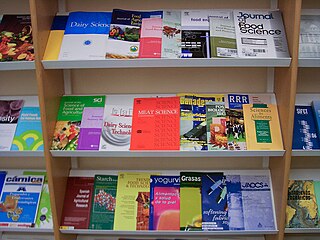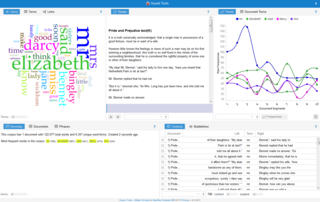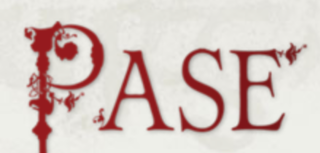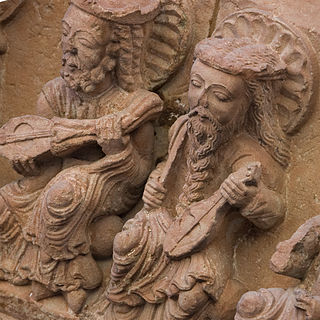Related Research Articles
A mailing list is a collection of names and addresses used by an individual or an organization to send material to multiple recipients. The term is often extended to include the people subscribed to such a list, so the group of subscribers is referred to as "the mailing list", or simply "the list".

An academic journal or scholarly journal is a periodical publication in which scholarship relating to a particular academic discipline is published. Academic journals serve as permanent and transparent forums for the presentation, scrutiny, and discussion of research. They nearly universally require peer review for research articles or other scrutiny from contemporaries competent and established in their respective fields.

Roberto Busa was an Italian Jesuit priest and one of the pioneers in the usage of computers for linguistic and literary analysis. He was the author of the Index Thomisticus, a complete lemmatization of the works of Saint Thomas Aquinas and of a few related authors.

Digital humanities (DH) is an area of scholarly activity at the intersection of computing or digital technologies and the disciplines of the humanities. It includes the systematic use of digital resources in the humanities, as well as the analysis of their application. DH can be defined as new ways of doing scholarship that involve collaborative, transdisciplinary, and computationally engaged research, teaching, and publishing. It brings digital tools and methods to the study of the humanities with the recognition that the printed word is no longer the main medium for knowledge production and distribution.

The Prosopography of Anglo-Saxon England (PASE) is a database and associated website that aims to construct a prosopography of individuals within Anglo-Saxon England. The PASE online database presents details of the lives of every recorded individual who lived in, or was closely connected with, Anglo-Saxon England from 597 to 1087, with specific citations to each primary source describing each factoid.

H-Net is an interdisciplinary forum for scholars in the humanities and social sciences. It is best known for hosting electronic mailing lists organized by academic disciplines; according to the organization's website, H-Net lists reach over 200,000 subscribers in more than 90 countries.

HASTAC (/ˈhāˌstak/'), also known as the Humanities, Arts, Science and Technology Alliance and Collaboratory, is a virtual organization and platform of more than 18,000 individuals and 400+ affiliate-institutions dedicated to innovative new modes of learning and research. HASTAC network members contribute to the community by sharing work and ideas with others via the open-access website, by hosting HASTAC conferences and workshops online or in their region by initiating conversations, or by working collaboratively with others in the HASTAC network.

The Digital Classicist is a community of those interested in the application of digital humanities to the field of classics and to ancient world studies more generally. The project claims the twin aims of bringing together scholars and students with an interest in computing and the ancient world, and disseminating advice and experience to the classics discipline at large. The Digital Classicist was founded in 2005 as a collaborative project based at King's College London and the University of Kentucky, with editors and advisors from the classics discipline at large.
The Canadian Society for Digital Humanities is a Canadian scholarly association. Its full name is Society for Digital Humanities/Société canadienne des humanités numériques (CSDH-SCHN). The CSDH-SCHN was founded as the COCH/COSH or Consortium for Computers in the Humanities/ Consortium pour ordinateurs en sciences humaines in 1986. The organization changed its name to the Society for Digital Humanities/Société pour l'étude des médias interactifs (SDH/SEMI), but became CSDH-SCHN after 2007, when it was enfranchised by the Alliance of Digital Humanities Organizations.

The Department of Digital Humanities (DDH) is an academic department and research centre in the Faculty of Arts & Humanities at King's College London. DDH counts amongst the "most visible" digital humanities centres worldwide. Its research activities cover themes such as digital cultures, past and present; technology, media and participation; data worlds; digital economy and society; and digital epistemology and methods.

Digital Medievalist is an academic project and community-building organization for those who are interested in the use of computers and computational techniques in the academic field of medieval studies, a sub-field of digital humanities.

The Alliance of Digital Humanities Organizations (ADHO) is a digital humanities umbrella organization formed in 2005 to coordinate the activities of several regional DH organizations, referred to as constituent organizations.
The Digital Humanities conference is an academic conference for the field of digital humanities. It is hosted by Alliance of Digital Humanities Organizations and has been held annually since 1989.

The European Association for Digital Humanities (EADH), formerly known as the Association for Literary and Linguistic Computing (ALLC), is a digital humanities organisation founded in London in 1973. Its purpose is to promote the advancement of education in the digital humanities through the development and use of computational methods in research and teaching in the Humanities and related disciplines, especially literary and linguistic computing. In 2005, the Association joined the Alliance of Digital Humanities Organizations (ADHO).
The Association for Computers and the Humanities (ACH) is the primary international professional society for digital humanities. ACH was founded in 1978. According to the official website, the organization "support[s] and disseminate[s] research and cultivate[s] a vibrant professional community through conferences, publications, and outreach activities." ACH is based in the United States, and has an international membership. ACH is a founding member of the Alliance of Digital Humanities Organizations (ADHO), a co-originator of the Text Encoding Initiative, and a co-sponsor of an annual conference.
The Digital Humanities Summer Institute (DHSI) is an annual digital humanities training program held in June at the University of Victoria, British Columbia, Canada. DHSI now attracts over 600 participants for two weeks of courses, forum discussions, paper sessions, and unconferences. DHSI has an International Advisory Board.
Willard McCarty is Professor of Humanities Computing in the Department of Digital Humanities at King's College London, England, where he is director of the doctoral programme in the department. He is a visiting professor in the Digital Humanities Research Group in the School of Humanities and Communication Arts at the University of Western Sydney, Australia. He is a Fellow of the Royal Anthropological Institute, London, and the editor of the Humanist Discussion Group established by him in 1987, dealing with humanities computing and the digital humanities.
Susan Hockey is an English computer scientist. She is Emeritus Professor of Library and Information Studies at University College London. She has written about the history of digital humanities, the development of text analysis applications, electronic textual mark-up, teaching computing in the humanities, and the role of libraries in managing digital resources. In 2014, University College London created a Digital Humanities lecture series in her honour.
Ray Siemens is a professor in the faculty of humanities at the University of Victoria, British Columbia, Canada and former Canada Research Chair in Humanities Computing. Siemens is a recipient of the Antonio Zampolli Prize, presented by the Alliance of Digital Humanities Organizations (ADHO) for outstanding contributions to the field of Digital Humanities.
Harold Short is Emeritus Professor of King's College London. He founded and directed the Centre for Computing in the Humanities until his retirement (2010). He was involved in the development with Willard McCarty of the world's first PhD programme in Digital Humanities (2005), and three MA programmes: Digital Humanities, Digital Culture and Society, and Digital Asset Management.
References
- ↑ Willard McCarty (June 15, 2008). "Report on Humanist 2007-8" (PDF). Archived from the original (PDF) on May 1, 2012. Retrieved October 20, 2013.
- ↑ What is Humanist?
- ↑ "Humanist Discussion Group - Volume 34". Archived from the original on 2020-09-29.
- ↑ "Humanist Discussion Group". Archived from the original on 2021-02-19.